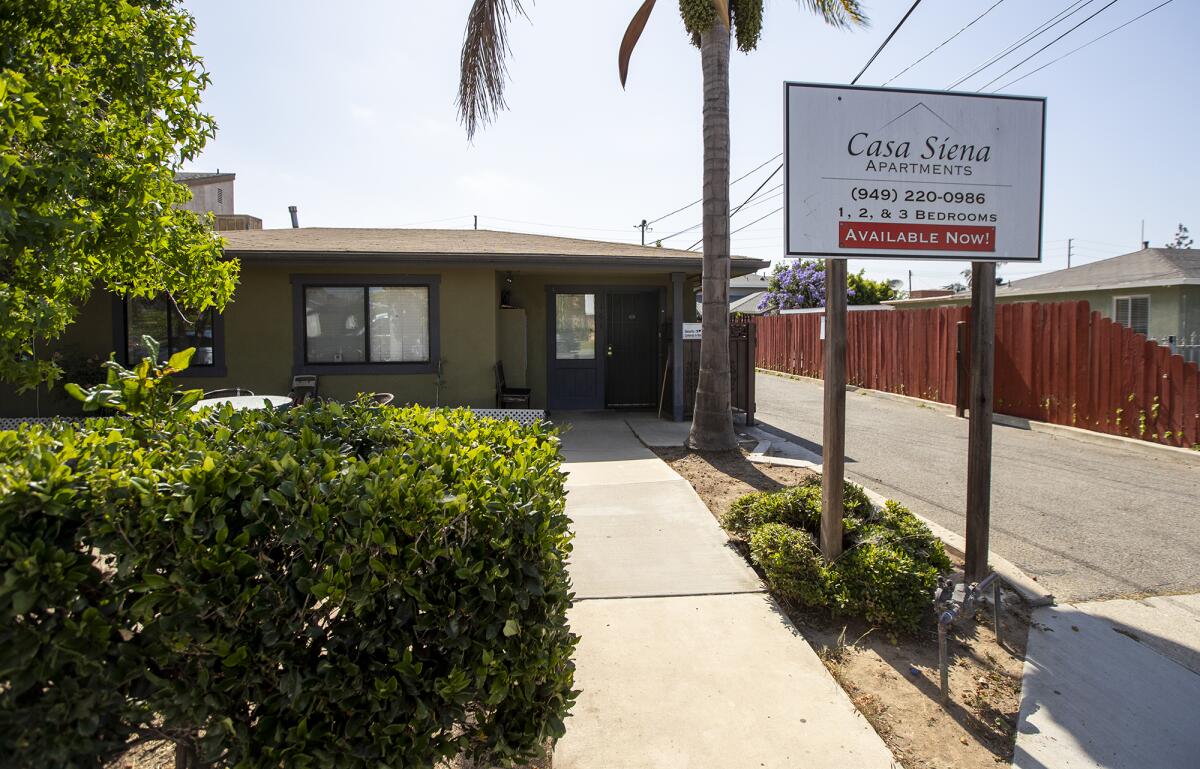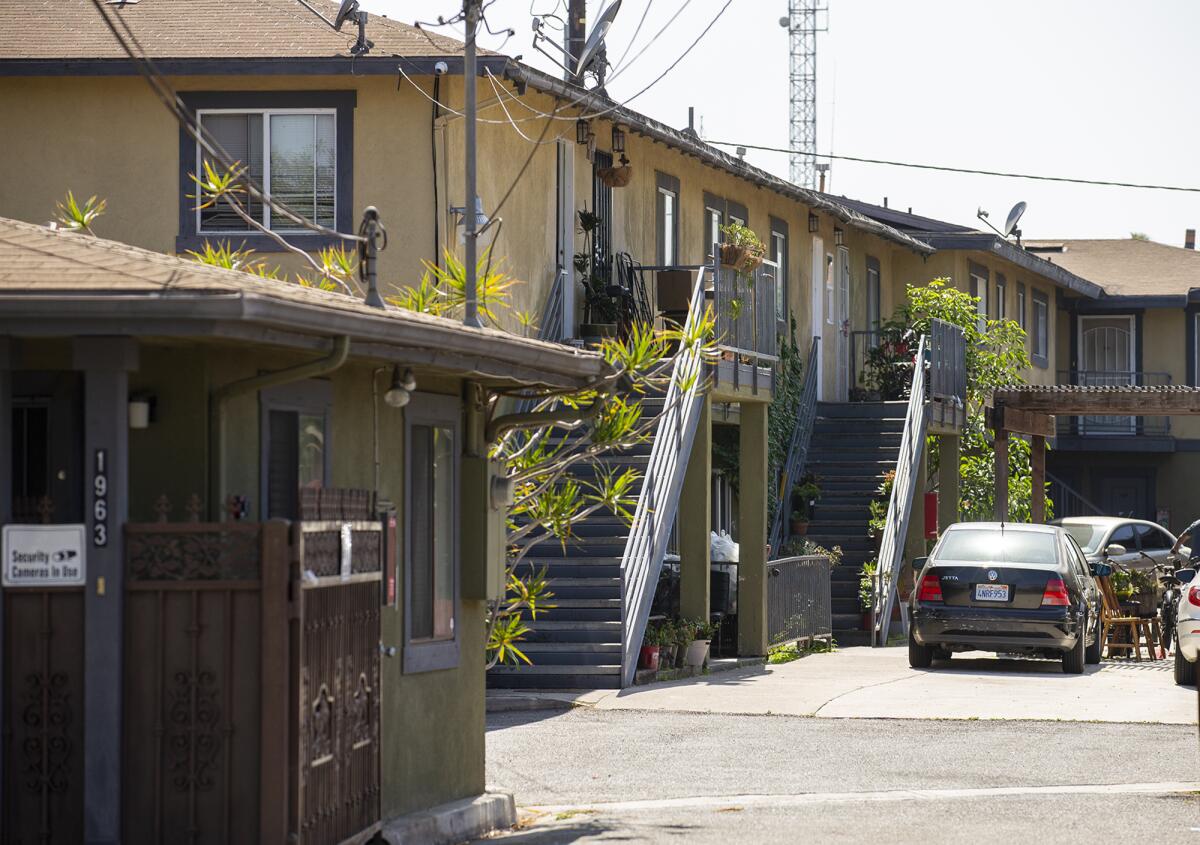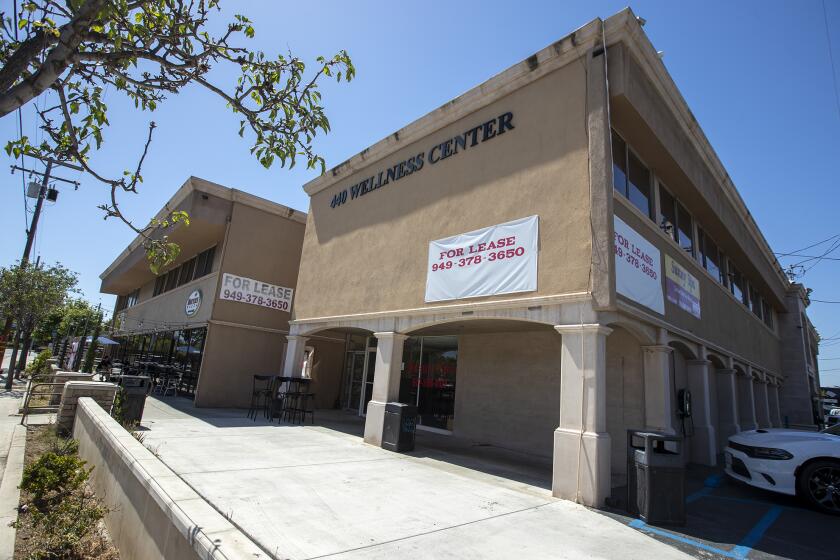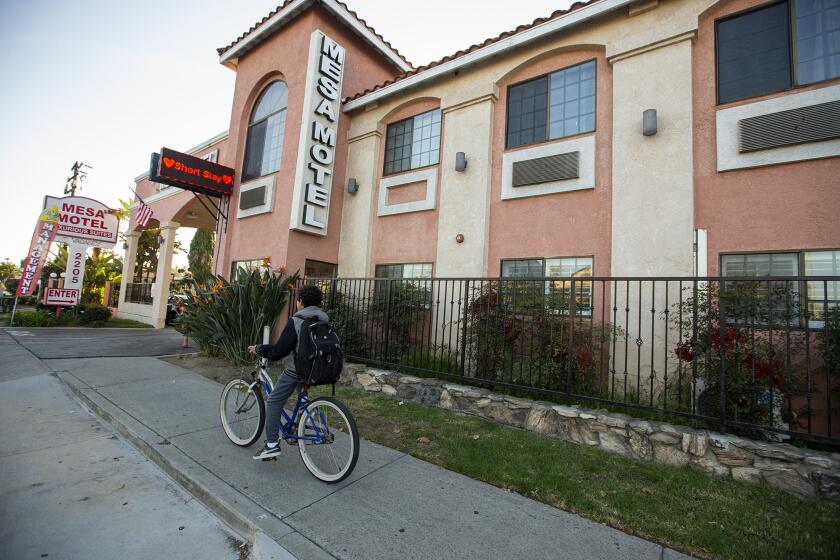Judge orders tenants of Costa Mesa complex relocated, problems fixed in receivership

- Share via
A Costa Mesa residential complex at the center of a lawsuit between the city and the building’s owner will soon be vacated and its tenants relocated under a court-ordered receivership, so unpermitted construction and safety issues can be corrected.
An Orange County Superior Court judge appointed a receiver for the property and in a May 16 order approved a relocation assistance plan authorizing up to $267,000 in loans be taken out to rehome tenants at 1963 Wallace Ave., reimburse their deposits and assist them with moving expenses.
Another $48,000 granted by the court may be borrowed for physical improvements, Costa Mesa City Atty. Kimberly Hall Barlow confirmed Tuesday.
City officials alleged in a February 2020 complaint the four-building property was illegally subdivided so that eight units, a manager’s office and four of eight garages on site were reconfigured into 19 dwellings, when only nine were permitted.

Responding to a complaint from a resident submitted in January 2019, Costa Mesa code enforcement officers inspected 10 of the units and reportedly observed “numerous unlawful and extremely dangerous substandard building violations.”
Officers later secured a warrant to inspect the remainder of the units, which they did on March 26, the lawsuit states. In addition to the illegal subdivision of units, they observed illegal plumbing and electrical connections, illegally added doors and a deteriorating exterior staircase and walkway.
“Some of the units had bedrooms that lacked windows, [and] several of the units had doorways sealed shut,” the complaint alleges. “The balcony walkways were unstable and shook when someone walked across them; many of the units had an insect infestation problem.”
Additional violations range from insufficient parking and unmaintained landscaping to inoperable vehicles on site and a lack of smoke and carbon monoxide detectors.
City officials claimed that, despite repeated visits and at least one notice of violation, the building’s owner — Nevada-based property management company D’Alessio Investments, LLC — failed to abate the violations.
“Given the substantial danger and imminent threat to the health, safety and life of any occupants or residents, the city has no other enforcement remedy remaining but to seek immediate court intervention,” they maintained in the suit.
Coroner’s officials have identified a man and woman whose bodies were discovered Saturday at 440 Fair Drive, a location that’s been in the city’s crosshairs for more than a decade.
D’Alessio Investments also owns commercial properties deemed problematic by city officials, including a Newport Boulevard smoke shop frequently cited for trash and nuisance-related issues and a complex on Fair Drive that’s been historically occupied by illegal marijuana dispensaries and massage parlors.
It is at that complex last June that two individuals — a masseuse and a man at the site — died from drug overdoses while on the property, according to toxicology reports later provided by the Orange County Coroner’s office.
That property, at 440 Fair Drive, is the subject of a separate legal dispute between business owner Dennis D’Alessio and the city of Costa Mesa that has lasted for more than a decade and is still ongoing.
Writing in opposition to the city’s complaint about the Wallace Avenue apartments in July 2020, attorneys for D’Alessio offered a different narrative of the buildings and their condition and described their client as the target of repeated harassment by city officials.
They claimed no substantial issues regarding the maintenance or habitability of the property were raised to owners until a resident — the same one who filed the initial code enforcement complaint with the city — was evicted and ordered by the court to pay $9,910 to D’Alessio for several months of back rent.
“On Feb. 12, 2019, D’Alessio raised [his] concerns with the evicted tenant’s complaint, the prior abuse by the city against D’Alessio and wanted to know the specific violations the city wants him to fix, but stated he is ready, willing and able to promptly fix any violations,” the document states.
Despite multiple correspondences from the owner and his legal counsel to city officials asking for more detail about the violations, attorneys claim city officials never provided clarification.
They further argue that the building, built in 1956, is legal nonconforming, meaning past improvements were made when laws and codes differed from today but complied at the time, and said the city’s building department approved a 17-unit configuration in 2015. They asked for reasonable time to address any violations.
Superior Court Judge David A. Hoffer authorized appointed receiver Eric Beatty to secure a one-year loan of up to $315,000 to execute the relocation assistance plan, secured by the property. The loan will be a lien on the property with super-priority repayment status, Hoffer ruled.
All the latest on Orange County from Orange County.
Get our free TimesOC newsletter.
You may occasionally receive promotional content from the Daily Pilot.





